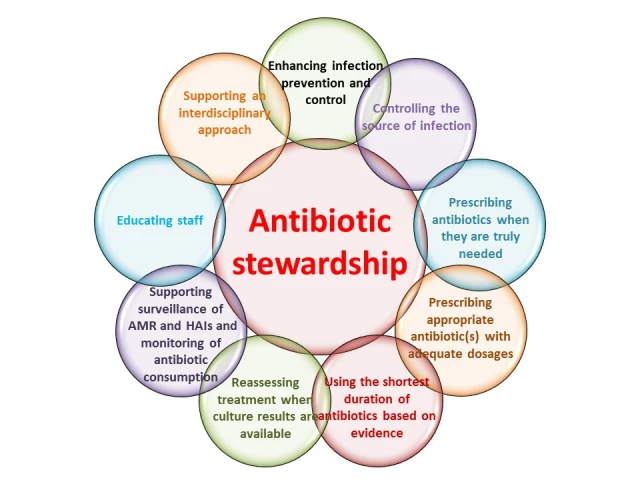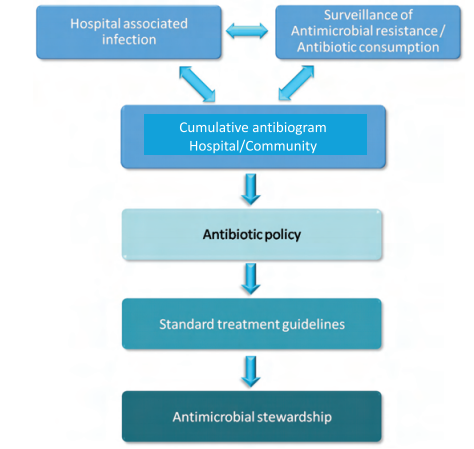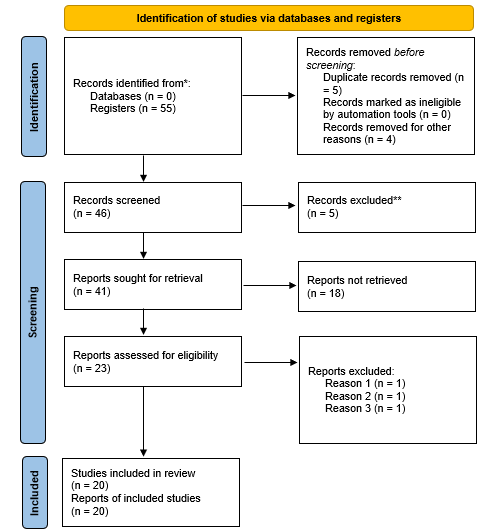HSSM66 Health Research Methods Assignment Sample
Module code and Title: HSSM66 Health Research Methods Assignment Sample
Research Background
Hospitals are increasingly indulging in “antibiotic stewardship” as an effort for measuring and improving prescription of antibiotics by clinicians along with their utilisation by patients. Accounting for improved antibiotic prescribing and usage is critical for effective treatment of infections, protecting patients and combating antibiotic resistance (CDC, 2022).
Programs of “antibiotic stewardship” fosters scope for improving clinical outcomes in addition to minimising possible harms by bringing about improvements in antibiotic prescribing. The primary goal concerning “antibiotic stewardship” is an optimisation of clinical outcomes and minimisation of unintended consequences yielded by antimicrobial use. It also involves additional benefits of improving susceptibility rates concerning targeted antimicrobials while also promoting optimization of resource utilisation.
 Figure 1: Antibiotic Stewardship (Source: Influenced by CDC, 2022)
Figure 1: Antibiotic Stewardship (Source: Influenced by CDC, 2022)
Introduction of antibiotics into clinical practice and use is arguably addressed as a potential medical breakthrough. Besides treating infectious diseases, application of antibiotics fosters the scope for emergence of diverse modern medical procedures. However, prescribing antibiotics and utilisation of the same by patients often involve inconsistency with recommended prescribing practices. Reports from hospitals highlight that antibiotic prescribing failed to support 77% of patients suffering from “urinary tract infections” and 79% having “community-acquired pneumonia” (CDC, 2022).
This was also followed by incorrect prescription of antibiotics among 27% of patients prescribed with “intravenous vancomycin antibiotic” and 47% with “fluoroquinolone treatment”. This sheds light on the need for pharmacists and prescribers to improve antibiotic prescribing by aiming to optimise antibiotic selection. This also requires re-assessment of antibiotic treatment and applying the shortest effective duration relevant to the therapy.
Problem Statement
Healthcare facilities serve as potential risk factors for developing an antibiotic-resistant infection owing to their mass exposure to antibiotics and receiving a range of hands of care. This is substantially attributed to the fact that resistant germs tend to be more prominent in hospitals than in the broader community, thereby making patients more exposed to them. Versporten et al. (2018) asserted that worldwide surveillance tends to be accomplished by Global-PPS following voluntary participation.
The emerging threat concerning antibiotic resistance is identified to be growing exponentially with “antibiotic stewardship programs” (ASPs) serving as a cornerstone in combating the global threat. Atif et al. (2021) opined that poor knowledge of Pakistani doctors regarding ASP along with non-existence of antibiograms concerning their hospitals plays a challenging role. It also involves inadequate rules for the safe application of antibiotics compounded with irrational practices of antibiotic prescription.
Antibiotics serve as life-saving drugs with a major half of the hospitalised patients receiving antibiotics. However, it is argued that unnecessary over-application and consumption of antibiotics has resulted in the onset of “multidrug-resistant (MDR) bacterial strains”, thereby making them ineffective. Atif et al. (2021) put forward that reports from the “Centers for Disease Control and Prevention (CDC)” highlights an annual loss of 23,000 lives caused by MDR bacteria.
This is also stipulated to result in an alarming 10 million deaths by 2050 by antibiotic resistance (AR) in absence of timely measures. Following a focus on Pakistan, a significant increase in MDR infections is attributed to a broad spectrum of unwarranted antibiotic usage along with insufficient “infection prevention and control (IPC)”. According to Saleem et al. (2019), Pakistan hospitals tend to be unaware of “antibiotic stewardship programs” (ASPs) that serve as a major concern. It is also followed by lack of proper antibiotic stewardship policies causing a surge in AR over the years in Pakistan.
Aim and Objectives
Aim
The following study will aim at making a systematic review for understanding the context of antimicrobial resistance in hospitals of Pakistan and identifying relevant antimicrobial prescribing guidelines.
Objectives
- To analyse the components of antibiotic resistance and development of multidrug-resistant strains in the process.
- To investigate the rational use of antibiotics and prescribing practices concerning hospitals in Pakistan.
- To identify factors associated with uncontrolled antibiotic prescription by doctors in Pakistani hospitals.
- To evaluate physician practices regarding distinct attributes of “antibiotic stewardship programs” (ASPs).
- To determine adequate antibiotic stewardship policies for hospitals in Pakistan for reducing the risk of AR and MDR.
PICO
Question: How can hospitals in Pakistan address “antibiotic stewardship” for following antimicrobial prescribing guidelines in reducing antimicrobial resistance?
| Problem | Intervention | Control | Outcomes |
| Development of antibiotic resistance among patients with prescribed antibiotics that are inconsistent with recommended prescribing practices | Antibiotic Stewardsthe hip Programs for compliance with prescribing guidelines | Optimisation of antibiotic selection, re-assessment of antibiotic treatment and analysing accurate duration of treatment | Improved antibiotic prescribing as per guidelines and minimising harms among patients. |
Table 1: PICO (Source: Created by Researcher)
Literature Review
Context of Antimicrobial Resistance
(AMR) refers to a condition where bacteria change over a certain time and fail to make any response to consumed medicines. This makes the process of treating infections significantly harder followed by an increased risk of spreading diseases, severe illnesses and ultimate death. A substantial cause relevant to the development of AMR is antibiotic use with over-utilisation being the most relevant factor.
Higher usage of antibiotics results in an increased risk of bacteria developing resistance against them. Hofer (2019) asserted that the cost associated with antimicrobial resistance tends to be immense on grounds of both human health and economic conditions. Reports by OECD highlight the scope of about 2.4 million people residing in Australia, North America and Europe with an immediate risk of dying from AMR in the coming 30 years with an annual cost of US$ 3.5 billion.
Challenges faced by Hospitals towards Poor Antibiotic Prescribing
Hospitals are noted to account for a range of factors that result in AMR emerging as a serious threat to global public health. Wojcik et al. (2021) put forward that a leading challenge towards AMR is antibiotic misuse by hospitals followed by a lack of evidence-based interventions. This is identified to result from existing tension between public health concerns and individual care, ownership loss concerning prescribing decisions and association with diverse priorities by clinicians.
AMR is also the result of a diverse range of patient-related determinants that influence antibiotic usage. A study by Zanichelli et al. (2019) opined that there are seven broad classes of determinants that garner an impact on distinct attributes of antibiotic usage. In descending order, the characteristics involve socio-economic and demographic, patient-doctor interactions, treatment and attitudes. This is also followed by the other parameters including treatment access, health condition concerning the prescribed antibiotic and knowledge.
Antimicrobial Prescribing Guidelines for Hospitals
 Figure 2: Antibiotic Policy (Source: WHO, 2018)
Figure 2: Antibiotic Policy (Source: WHO, 2018)
A preliminary aim associated with antibiotic policy as guidelines for hospitals is minimising mortality and morbidity caused by AMR. It is also aimed at preserving effectiveness of antimicrobial agents in the prevention and treatment processes of communicable diseases. The antimicrobial prescribing guidelines developed by hospitals tend to vary across geographical regions.
For instance, Gürtler et al. (2019) established the need for antimicrobial stewardship efforts and national initiatives for prescribing guidelines in Switzerland. This is also found to be equally prominent among major cities of Australia following their engagement in supporting AMS programs (Bishop et al. 2019). Following an emphasis on India, the nation accounts for routine “antibiotic susceptibility testing (AST)” followed by implementation of infection control practices in hospitals and spreading knowledge (NCDC, 2018).
An aspect of Antibiotic Stewardship Programs
A consideration made with antibiotic selection as part of ASP is an antibiotic spectrum that tends to be dependent on usual site-related pathogens. Clinicians require avoiding over-treating and over-covering colonising organisms at their specific sites (Cunha and Opal, 2018). On this note, AMS entails the objectives of providing a tool for developing nations as a way for establishing practices and procedures to formulate hospital antibiotic policy.
This also involves accounting for standard treatment guidelines that can yield rational utilisation of antibiotics along with minimising emergence of AMR (WHO, 2018). The hospital antibiotic policy as part of the ASP includes addressing antibiotic activity spectrum, pharmacokinetics, adverse effects, cost and special needs.
Antibiotic Stewardship Programs in Pakistan Hospitals
The most prominent antibiotic stewardship operations undertaken by hospitals in Pakistan involve clinical pharmacy services and integration of therapeutics and drug committees. This also includes using antimicrobial prescribing guidelines, frequent auditing by doctors and consultation services as practised approaches. According to Atif et al. (2020), Pakistan has a significant preference for community pharmacists being attributed as antibiotic stewards.
However, they are also noted to be potentially unaware of any offered ASP relevant to their community pharmacy setting. This has shed light on the need for Pakistani hospitals to address ASP for promoting adequate outcomes in their clinical settings.
Literature Gap
A significant literature gap concerning this research subject is limited insight and available information regarding antimicrobial prescribing guidelines. This is also followed by the fact that there tend to be limited research works focusing on challenges faced by hospitals in Pakistan that promote AMR.
Inclusion and Exclusion Criteria
The following systemic review will account for a range of inclusion and exclusion parameters that will help in driving the accuracy of the outcomes. On grounds of inclusion components, the concerning research work will ensure using research articles that belong to the span from 2017 through 2022. This will prove effective in collecting current practices and avoiding old data.
The research will also include collecting sources that have open access, thus allowing the researcher to have a complete understanding of the findings. Sources that are already published in credible journals with English being the source of language will be parameters for shortlisting academic articles. It is also to be made certain that the research articles comply with the specified keywords for this subject. The academic sources that fail to address any of these inclusion factors will be excluded from this research work.
Search Databases
The subsequent research study will abide by collecting data from credible databases as a tool for reliability and validity. In this respect, the study will prefer resorting to CINAHL for gathering potential sources. It will also involve assistance from Springer and ResearchGate for credible findings.
Proposed Search Strategy
As a need for addressing the proposed objectives, the following study will follow a systematic review format. It will make use of an extensive search process for adequate data screening and analysis. Ali and Usman (2018) stated that reliability in systematic literature reviews is largely dependent on the undertaken search approach. In this context, the concerning research work will incorporate credible keywords relevant to the research subject.
This will be accompanied by a range of exclusion and inclusion parameters for collection of the authentic and credible sources. The keywords to be followed for this study will include “Antimicrobial Resistance”, “AMR”, “Antimicrobial Prescribing Guidelines”, “Antimicrobial Stewardship”, “Programs”, “ASP”, and “Hospitals”, “Pakistan” with associated terminologies. This will also entail the application of Boolean Operators like “AND” and “OR” that will be effective in refining and expanding the search process. The study will entail collection of data from prominent journal bases and mentioned databases without using data from websites and magazines among others.
Data Extraction and Analysis
Collection of credible academic sources will be directed at assisting with extracting data that can help in addressing AMR in Pakistani hospitals. It will involve highlighting the search process through a PRISMA flow chart and using the CASP tool for adequate interpretation. The process will account for addressing concepts relevant to the mentioned keywords and how they correlate with Pakistan. Besides, analysing the data will involve a manner that can establish compliance with the postulated questions.
 Figure 3: PRISMA Flow Chart (Source: Presented by Researcher)
Figure 3: PRISMA Flow Chart (Source: Presented by Researcher)
Ethical Approval
The concerning research work will abide by potential ethical parameters for authenticity and credibility. A foremost attribute to be addressed is adhering to the ethical guidelines promoted University of Sunderland. This will be followed by practising academic integrity that can garner a sense of trust. The study will ensure accurate referencing and citation for promoting a sense of mutual respect and fairness towards other authors. The study will also make certain to comply with the “Copyright, Designs and Patents Act 1988 (c.48)”.
Time Frame
| Main Operations | Week 1 | Week 2 | Week 3-5 | Week 4-5 | Week 6 | Week 7-16 | Week 17-18 |
| Topic Finalisation | |||||||
| Outlining Research Work | |||||||
| Exploring Literature | |||||||
| Finalising Research Techniques | |||||||
| Submitting Proposal | |||||||
| Gathering Relevant Sources for Final Work | |||||||
| Designing the Systematic Review | |||||||
| Deriving Conclusions | |||||||
| Presentation |
Table 2: Time Frame (Source: Created by Researcher)
Reference List
Ali, N.B. and Usman, M., (2018). Reliability of search in systematic reviews: Towards a quality assessment framework for the automated-search strategy. Information and Software Technology, 99, pp.133-147.
Atif, M., Asghar, S., Mushtaq, I. and Malik, I., (2020). Community pharmacists as antibiotic stewards: a qualitative study exploring the current status of Antibiotic Stewardship Program in Bahawalpur, Pakistan. Journal of Infection and Public Health, 13(1), pp.118-124.
Atif, M., Ihsan, B., Malik, I., Ahmad, N., Saleem, Z., Sehar, A. and Babar, Z.U.D., (2021). Antibiotic stewardship program in Pakistan: a multicenter qualitative study exploring medical doctors’ knowledge, perception and practices. BMC infectious diseases, 21(1), pp.1-11.
Bishop, J.L., Schulz, T.R., Kong, D.C., James, R. and Buising, K.L., (2019). Similarities and differences in antimicrobial prescribing between major city hospitals and regional and remote hospitals in Australia. International journal of antimicrobial agents, 53(2), pp.171-176.
CDC (2022). Core Elements of Antibiotic Stewardship. Available at: https://www.cdc.gov/antibiotic-use/core-elements/index.html [Accessed on: 15 July 2022]
Cunha, C.B. and Opal, S.M., (2018). Antibiotic stewardship: strategies to minimise antibiotic resistance while maximising antibiotic effectiveness. Medical Clinics, 102(5), pp.831-843.
Gürtler, N., Erba, A., Giehl, C., Tschudin-Sutter, S., Bassetti, S. and Osthoff, M., (2019). Appropriateness of antimicrobial prescribing in a Swiss tertiary care hospital: a repeated point prevalence survey. Swiss Medical Weekly, (41).
Hofer, U., (2019). The cost of antimicrobial resistance. Nature Reviews Microbiology, 17(1), pp.3-3.
NCDC (2018). National Treatment Guidelines for Antimicrobial Use in Infectious Diseases. Available at: https://ncdc.gov.in/WriteReadData/l892s/File622.pdf [Accessed on: 17 July 2022]
Saleem, Z., Hassali, M.A., Hashmi, F.K., Godman, B. and Ahmed, Z., (2019). Snapshot of antimicrobial stewardship programs in the hospitals of Pakistan: findings and implications. Heliyon, 5(7), p.e02159.
Versporten, A., Zarb, P., Caniaux, I., Gros, M.F., Drapier, N., Miller, M., Jarlier, V., Nathwani, D., Goossens, H., Koraqi, A. and Hoxha, I., (2018). Antimicrobial consumption and resistance in adult hospital inpatients in 53 countries: results of an internet-based global point prevalence survey. The Lancet Global Health, 6(6), pp.e619-e629.
WHO (2018). Step-by-step approach for development and implementation of hospital antibiotic policy and standard treatment guidelines. Available at: https://apps.who.int/iris/rest/bitstreams/913963/retrieve [Accessed on: 17 July 2022]
Wojcik, G., Ring, N., McCulloch, C., Willis, D.S., Williams, B. and Kydonaki, K., (2021). Understanding the complexities of antibiotic prescribing behaviour in acute hospitals: a systematic review and meta-ethnography. Archives of Public Health, 79(1), pp.1-19.
Zanichelli, V., Tebano, G., Gyssens, I.C., Vlahović-Palčevski, V., Monnier, A.A., Benic, M.S., Harbarth, S., Hulscher, M.E.J.L., Pulcini, C. and Huttner, B.D., (2019). Patient-related determinants of antibiotic use: a systematic review. Clinical microbiology and infection, 25(1), pp.48-53.
Know more about UniqueSubmission’s other writing services:

